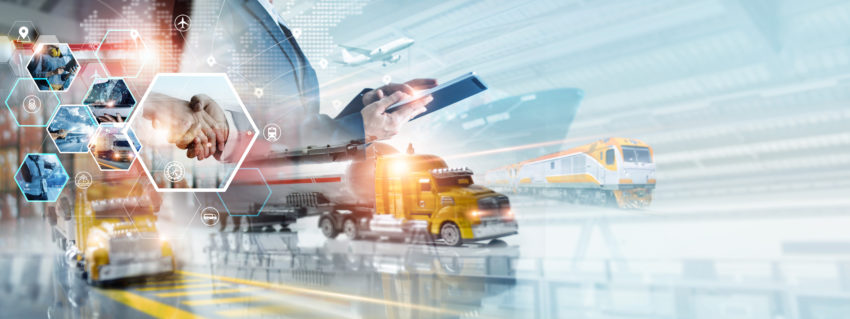
Nearly all sectors embrace technology to streamline operations as the world becomes increasingly digital. Every industry is distinct, and technology is transforming them in various ways. The trucking industry is no different.
The trucking industry is one of many that is benefiting from technological advancement. Given the significance of this industry to the global economy, it is great to see technology being used to enhance supply chain efficiency. Firms can automate the supply chain in several ways. By doing this, they may increase their operational efficiency.
A trucker’s primary objective is to move things from point A to point B efficiently. But achieving this won’t be simple. Transporters must manage various issues, such as driver retention, fleet maintenance, quality control, and safety concerns. Fortunately, technologies are available to aid the transportation sector in enhancing the efficiency of its operations. Below is an overview of how technology is transforming the trucking industry.
- Trucking Applications
People’s reliance on mobile devices and the Internet of Things (IoT) has sparked an all-time high in mobile application development. People make applications for a variety of reasons. The trucking industry is not an exception since businesses employ a variety of trucking software to manage their fleet. These applications also allow them to interact easily with drivers on the road and provide the most efficient route updates.

The best truck driver apps make fleet management extremely convenient because you can manage your fleet remotely. Whether you’re a driver or a technician, you can easily communicate with your team via some trucking applications. The application will constantly update you about the truck’s activity and location. But note that there are several applications to choose from. So, make sure you choose one depending on your specific needs.
- Electrical Vehicles
The climate change crisis has been well documented. The general public now knows the damaging effects of some human activities on the environment. There is currently a movement to make things greener because of this. Because trucks are mostly gasoline-powered, the trucking industry contributes significantly to emissions. The goal is to reduce emissions by phasing out fossil fuels.
Trucking companies, aware of the climate crisis and wanting to green their business models, are now investing in electric vehicles (EVs). EVs are claimed to be much more environmentally friendly because of their low emissions. In recent years, interest in personal electric cars has increased. Electric vehicles, however, are a relatively new technology. However, more truck manufacturers are hopping on board and creating their models.
The use of EV trucks will grow as governments continue to press transportation businesses to green their supply chains. It’s also reasonable to expect EV technologies to improve and extend the range of these vehicles. The range is important because trucks are designed to travel long distances before refueling. There’s a long way to go in improving EV trucking technology, but it’s already come a long way.
- Fleet Management Software
Trucking companies frequently have many moving parts. Managing a truck fleet is a difficult task. The more trucks on the road, the more complicated it becomes. Monitoring trip schedules, truck maintenance, compliance, and driver remuneration can be a nightmare. As a result, investing in fleet management software is essential.
This solution helps you stay on top of fleet maintenance in various ways. It can be integrated with other system components to generate accurate metrics. Because it can track multiple metrics, it also allows you to create accurate data about how your fleets are performing. Using this data, you can generate reports to make more informed decisions about your fleet. It also makes it easy to spot any discrepancies in your fleet.
- Vehicle Safety
When it comes to trucking, road safety is a hot topic. There are many truck-related accidents on the road each year. These collisions can be fatal, especially when smaller cars are involved. Such accidents ought to be prevented at all costs. However, there are various variables in accidents that you cannot always control. All a driver can do is drive as cautiously as they can.
Thankfully, modern vehicles come equipped with cutting-edge security protocols to keep drivers safe on the road. Technologies like truck dash cams, automated emergency braking, lane keep assist, and blind spot assist are extensively employed in the industry. These technologies help to prevent accidents on the road and, above all, help drivers get from point A to point B safely.
- Digital Automation
Various parts of the supply chain are being automated due to technological advancements. Several supply chain players are implementing artificial intelligence (AI) and machine learning (ML) to automate repetitive tasks in workflows. Automation is highly beneficial because it frees up time for employees to focus on more critical and non-repetitive functions that require more complex reasoning. Machines excel at repetitive tasks and, unlike humans, rarely make costly errors.
Currently, a few individuals are apprehensive about automation. The worry is that, ultimately, automation will take the place of truck drivers. Although these worries are reasonable, it’s crucial to remember that with current technology, you cannot entirely eradicate human effort.
People perform tasks that machines don’t excel at. For example, consider the regular inspections drivers and engineers must do to verify that trucks are in working order. Furthermore, consider that face-to-face interactions cannot be easily replaced by technology. Therefore, it is doubtful that the sector will become wholly automated soon.
- Data Analytics
Modern trucks are usually outfitted with a plethora of sensors and tracking devices. These devices can generate bouts of data which truckers will then use to evaluate the performance of a fleet. Data analytics has recently gained popularity in the trucking industry as a means of unlocking previously unattainable efficiencies.
The transportation business produces a lot of data. This information comprises, among other things, details about the transactional history, price information, and maintenance records. Thankfully, truckers can use big data analytics solutions to assist with procedures like route optimization, ensuring that drivers take the most efficient routes possible. Big data analytics allows organizations to produce and evaluate data to make fact-based decisions.
Conclusion
The technologies mentioned above are critical to trucking companies and their drivers. They are also likely to become even more critical as technological transformation continues. As technology advances, these existing tools will improve, and even more powerful innovations will enter the market. Nonetheless, these advancements are greatly appreciated because the trucking industry is critical to the global economy. Suppose the supply chain is well optimized; the world benefits. Nevertheless, it will be interesting to see what new technologies emerge in the future and how existing ones fare over time.